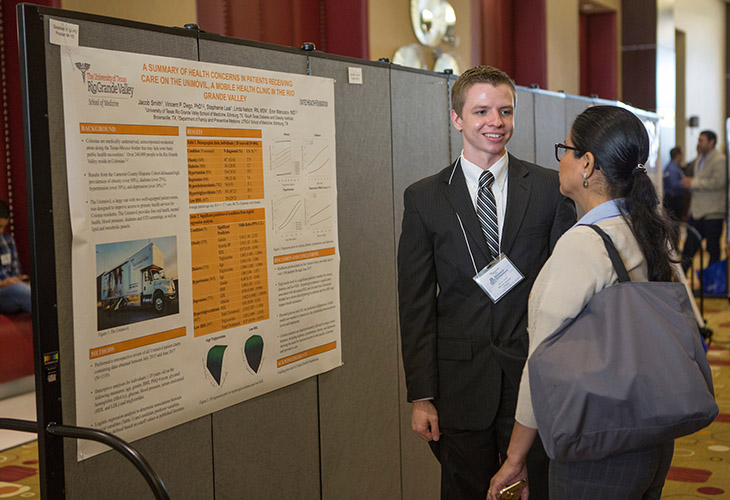Document Type
Conference Proceeding
Publication Date
4-2022
Abstract
Abstract
Introduction: Social determinants of health, such as financial instability, lack of a safe and sanitary housing environment, low educational attainment, language barriers, and a high level of disease/trauma burden, have a profound impact on the RGV colonia patient population. These factors continue to adversely impact patient access to needed health care services and contribute to the health disparities seen in the region. To address and mitigate these barriers to quality care, UTRGV SOM, The AHEC Scholars Program, and HRSA have sponsored a student-run patient navigation service initiative for patients of three AHEC Clinics (San Carlos, Bob Clark, and La Victoria). By facilitating communication between AHEC clinicians, patients, and community resources and services, health professions students can improve coordination of care and reduce barriers to care recommendations for patients while also gaining a valuable educational supplement experience.
Methods: A mixed-methods exploratory pilot study was conducted to determine the feasibility and acceptability of this ongoing initiative. Three stakeholder groups of the intervention were surveyed: clinicians, health professions student navigators, and patients. Clinicians and health professions students were administered an online survey via email. Patients who have completed their use of patient navigation services were administered satisfaction surveys via telephone in their preferred language. Each stakeholder group was surveyed monthly for the first three months of program implementation to account for the possible addition of members and/or a shift in opinion over time.
Results: Survey results revealed uniformly positive feedback from clinicians, HCSNs, and patients This ongoing program intervention is determined to be efficacious and feasible in the lower RGV AHEC clinics. Suggestions for further improvement were qualitatively analyzed and recorded in a sunburst graph to visualize the diversity of opinions. Effective communication and HCSN training were the most substantial categories for change. The importance of the other domains impacting successful healthcare navigation varied across stakeholder groups, but nonetheless, provided quality feedback for improvement.
Discussion: A centralized effort amongst health professions student, clinicians, and administrative staff of the AHEC Scholars program led to the successful design and implementation of a multidisciplinary healthcare systems navigation intervention to address health disparities experienced by residents of the colonias in the lower RGV. Our data suggest that the HCSN intervention is a promising and acceptable to link patients, providers, and community resources to address barriers to care and to instill the importance of addressing social determinants of health for health professional trainees.
Recommended Citation
Orta, Sabrina; Suleman, Saba; Alvarez, Samuel; Garza, Miguel; and Bouls, Ruayda, "Patient Navigation Services in the Rio Grande Valley: Impacts on Clinicians, Students, and Patients" (2022). MEDI 8127 Scholarly Activities Pre-Clerkship. 14.
https://scholarworks.utrgv.edu/som8127/14
Academic Level
medical student
Mentor/PI Department
Population Health and Biostatistics


